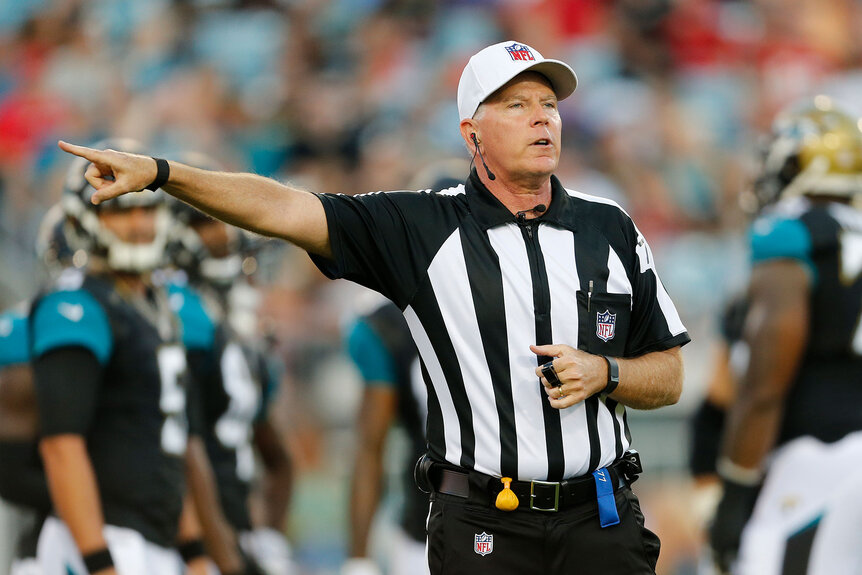What Are the NFL’s Overtime Rules For 2024 Season? Everything to Know
Are you ready for some bonus football?!
With parity in the NFL at an all-time high, it’s getting tougher and tougher to predict the winners, as you can expect at least a few football games to go down to the wire each and every weekend. Sometimes, those games even go past the wire, and we get overtime.
While it's bonus ball for the rest of us, the NFL teams involved in overtime games have to dig deep, both physically and mentally, to play what can boil down to a lot of exhausting extra football. While there’s certainly plenty of tactics and strategy involved in overtime games, it all starts with knowing the rules… which are admittedly a bit complicated. So what are the NFL overtime rules for 2024?
RELATED: The Starting Quarterback for Every NFL Team in the 2024 Season
With Sunday Night Football back on NBC and Peacock, and close games pretty much guaranteed, let’s take a look at the NFL’s ever-evolving overtime rules, both for the regular season and playoffs.
How does overtime work in the NFL's regular season?
If an NFL game ends with a tie score at the end of regulation, each team receives two bonus timeouts, and the visiting team captain calls the coin toss to determine who gets the ball and who defends which goal. Then the teams head to a 10-minute modified sudden-death overtime system, which will hopefully determine an outright winner (although that doesn’t always happen, at least not in the regular season). And sorry, but there’s no coach’s challenges, as all instant replay reviews are initiated by the officials.
The current rules are intended to give both teams a fighting chance in overtime. While previous rules allowed a team to win the coin toss, receive the overtime kick off, and go down and kick a field goal for the win, nowadays, both teams get an opportunity to receive the football… well, unless the team that gets the ball first goes down and scores a touchdown. Then it’s game over, with the losing team not getting a chance to possess the ball. But if they hold the initial team to a field goal on their first possession of overtime, the second team gets a chance to go down the field themselves, and either kick a field goal to extend the game, or score their own touchdown to end it.
RELATED: Everything to Know About NBC's 2024 Sunday Night Football Broadcast Team
Now, let’s say neither team scores on their initial possession. Then it becomes true sudden death play, where any score – be it a field goal, or touchdown, or safety – ends the game right then and there, no extra point necessary.
If the overtime period ends in a tie, neither team wins, and both teams record a tie, which can make the playoff picture even more complicated at the end of the year when overall records come into play.
While nobody likes ties, in order to insure player safety during the regular season, we’ve learned to live with them. Alas, that’s not the case for the playoffs, as you have to win to advance to the next round (or to be named the Super Bowl champs).
What are the NFL’s overtime rules for the playoffs?
In 2022, the NFL’s overtime rules were amended for the postseason, giving both teams the opportunity to possess the ball in overtime, even if the first team to possess the ball scores a touchdown. If the second team goes down and matches the points scored by the initial team, the game keeps going.
If the first overtime period expires, or if the second team's initial overtime possession has not ended, we get yet another overtime period. Whichever team lost the first overtime coin toss now chooses to possess the ball or selects which goal to defend… unless the winning coin guesser initially deferred that choice.
If no one scores, they just keep playing extra overtime periods until one team does, while taking a two-minute intermission between each overtime period. If there’s still no winner after a fourth overtime period, we get yet another coin toss, with play continuing until a winner (hopefully) emerges.
When did the NFL overtime rules change?
In 2010, the NFL installed a modified sudden-death overtime system for postseason games. The league expanded those rules to cover all NFL games two season later. In 2017, for the sake of safety, teams approved shortening overtime in the regular season from 15 minutes to 10 minutes. In 2022, NFL teams approved the postseason overtime rule allowing for both teams to possess the ball.
Catch Sunday Night Football on NBC and Peacock at 8:20 p.m. ET all season long. As always, each game will be preceded by Football Night in America starting at 7:00 p.m. ET, recapping the action of the day and looking ahead to the matchup of the night.


















